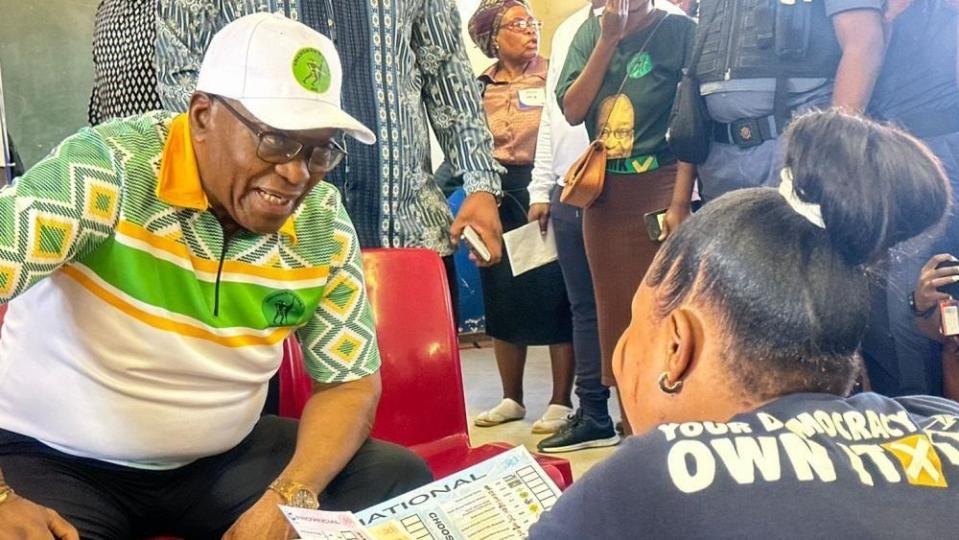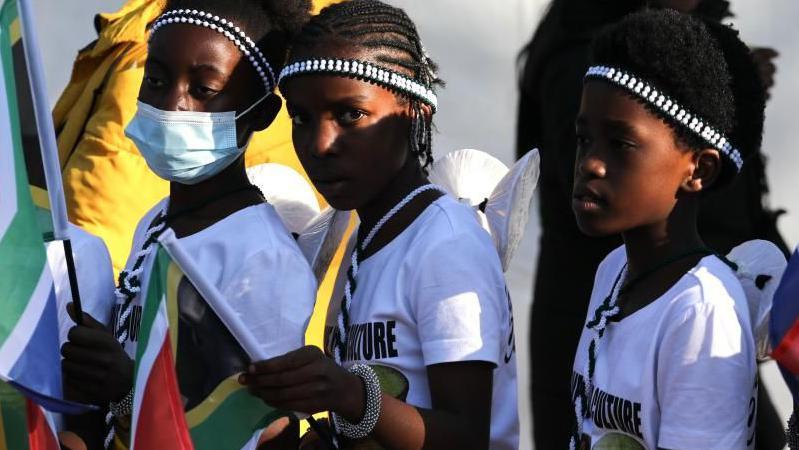Living up to his reputation as a skilled negotiator, South African President Cyril Rampahosa appears to have outmaneuvered his main coalition partner – the Democratic Alliance (DA) – in talks to form a new government, while also taking steps undertaken to neutralize radical opposition parties. they demand the nationalization of white-owned land.
Mr. Ramaphosa announced a 32-member cabinet on Sunday, in which he retained twenty posts – more than 60% – for his African National Congress (ANC).
In contrast, he gave the centre-right DA six seats – less than 20% – despite the party demanding 30%, after a power-sharing deal with the ANC failed to produce an outright winner after the May 29 elections.
But to double the DA’s representation, Mr Ramaphosa also appointed six party officials as deputy ministers, including in the area of finance, where the ANC’s Enoch Godongwana – respected by both business and trade unions – has retained control.
The appointments came after tough negotiations with the DA and a furious exchange of letters, in which Ramaphosaa accused the party of trying to form a “parallel government” in violation of the constitution.
Mr Ramaphosa further reduced the DA’s influence in the new cabinet by awarding another six posts to smaller parties – from the Pan Africanist Congress (PAC) to the Afrikaner nationalist Freedom Front Plus – making it the most ideologically diverse government in South Africa’s history.
In line with the tradition since the end of the racist apartheid system in 1994, the government also represents all racial groups, with a significant number of ministerial or deputy ministerial posts being given to members of the white, coloured – as mixed-race people are called in South Africa – and Indian communities.
This follows an election in which voters showed they “don’t care whether the cat is black or white, but whether it catches mice,” political analyst Thembisa Fakude told the BBC.
However, there is still resistance to Ramaphosa’s decision to sign a coalition agreement with the DA.
Led by John Steenhuisen, the party is often accused of trying to protect the economic privileges white people built up during apartheid – a charge it denies.
“Oil and water don’t mix,” a black security guard told the BBC.
Mr Ramaphosa presented his cabinet as a government of national unity and also gave a deputy ministerial post to the Muslim party Al Jama-ah, making it clear that he wants to continue supporting the Palestinians over Israel, despite opposition from the DA.
This perception was reinforced by the appointment of former Minister of Justice Ronald Lamola as Minister of Foreign Affairs.
Mr Lamola, a lawyer, led South Africa’s opening arguments in the genocide case it brought against Israel at the International Court of Justice.
He succeeds Naledi Pandor, who failed to be re-elected to parliament.
In addition to supporting the Palestinian cause, she also strengthened South Africa’s ties with the Brics club of nations, which is seen as a rival to the West, and with Russia.
Political analyst Prince Mashele told the BBC he doubted South Africa would remain a major international power as the ANC had lost its political dominance.
He argued that South Africa’s partners in the Brics – which include Brazil, Russia, India and China – “would realise that they are dealing with a weak partner”.


Ramaphosa was forced to establish a government of national unity after the ANC lost its majority in parliament for the first time.
He was only elected to a second term by parliament after the DA agreed to his support in exchange for a seat at the top of the government.
The ANC won 40% of the vote in the May elections, while the DA came second with 22%.
The DA initially demanded eleven cabinet posts – in addition to the vice-presidency or the post of minister in the presidency for Mr Steenhuisen.
Ultimately, Mr Steenhuisen had to settle for the post of Minister of Agriculture.
But Mr Steenhuisen welcomed the deal and said the DA is proud to take on the challenge and take our place in the seat of national government for the very first time.
He said the DA “refused to accept watered-down compromises and… sometimes negotiated hard to ensure that the portfolios we were given were actually substantial”.
Mr. Steenhuisen’s position is likely to allay the fears of the country’s white farmers. Many of them feel threatened by demands from the two largest opposition parties – former president Jacob Zuma’s MK party and Julius Malema’s Economic Freedom Fighters (EFF) – to nationalize white-owned land.
However, the DA leader’s appointment was nullified by Ramaphosa’s surprise decision to hand over the new land reform ministry to the Pan Africanist Congress (PAC), a former liberation movement that fought against white minority rule under the slogan “Africa for Africans”.
The PAC conducted its election campaign under the slogan “Our Country, Our Heritage” and called for “decolonization and return of land to its original owners”.
The portfolio, previously combined with agriculture, will be held by PAC leader Mzwanele Nyhontso.
The PAC’s decision to serve in government for the first time ever is likely to help Mr Ramaphosa fend off criticism from MK and the EFF that he has betrayed the liberation struggle by forming an alliance with the DA.


Ramaphosa retained all economic portfolios for the ANC. He abandoned plans to give the ministry of trade and industry to the DA, after fierce resistance within his party, but also from the black business and trade union lobby.
They believed that handing the portfolio to the DA would undermine the ANC’s black economic empowerment policies. The pro-free market DA opposes the policy, arguing it stifles investment, fuels corruption and simply enriches the ANC’s trade friends.
In his regular column on the TimesLive news site, former Business Day editor Peter Bruce said the ANC’s top brass “couldn’t stomach the prospect of the DA anywhere near pulling the economic levers”, forcing Mr Steenhuisen to settle with agriculture in a “mediocre mode of action”. ” for the Ministry of Trade and Industry.
Political analyst Ongama Mtimke told the BBC that the portfolios the ANC retained were important in addressing racial inequality, and that Ramaphosa’s choices were intended to “demonstrate to comrades that we are still on the right track in terms of advancing the revolution”.
But Mr Fakude said the ANC and DA were likely to reach sufficient agreement on economic policy.
The ANC had moved to the centre since it came to power three decades ago, although it could still disagree with the DA on issues such as privatisation, Mr Fakude said, adding: “Apart from that, I think they have a lot of things in common.”
Mr Ramaphosa gave the DA other key portfolios – including basic education in a country where literacy rates are low and language policy in schools is a highly emotive issue, public works and infrastructure, and home affairs.
The latter is seen as a political hot potato – as Mr Fakude noted, it “is about borders and illegal African immigration into South Africa”.
The Public Works Department has been embroiled in several corruption scandals and the district attorney has promised a “zero tolerance” approach to tackling the problem.
Mr Ramaphosa gave two portfolios to the Inkatha Freedom Party (IFP). Although allied with the DA, the party has maintained a neutral stance since the election, urging the two major parties to resolve their differences as they negotiated cabinet composition.
Mr Ramaphosa gave his leader Velinkosi Hlabisa the ministry of cooperative governance and traditional affairs. The IFP is close to the Zulu monarchy, with Mr Hlabisa’s appointment seen as another move by Mr Ramaphosa to neutralize the threat from Mr Zuma, who has called for greater powers for the largely ceremonial monarchs and chiefs of South Africa.
Mr Ramaphosa also handed over the all-important police ministry to an ANC leader from Mr Zuma’s home province of KwaZulu-Natal, which has a long history of political violence.
Senzo Mchunu succeeds another ANC leader from KwaZulu-Natal, Bheki Cele, who was not re-elected.
Mr Cele failed to contain violence in the province. More than 300 people were killed in riots following Mr Zuma’s 2021 jailing for contempt of court after he ignored an order to cooperate with a commission of inquiry into corruption during his presidency.
KwaZulu-Natal is likely to face a renewed threat of unrest when Zuma goes on trial, expected next year, on corruption charges over an arms deal negotiated in the 1990s.
Zuma denies all allegations and views the case as politically motivated.
The former president harbored deep enmity towards Ramaphosa, who ousted him as president in 2018. After cutting ties with the ANC in December last year, he campaigned for MK.
He led MK to third place in the elections and was instrumental in depriving the ANC of its parliamentary majority.
Now that the ANC and DA are inseparably linked, MK will take on the role of official opposition. This will set the stage for a fierce confrontation with the ANC and its new coalition partners.
More BBC stories about the South Africa elections:


Go to BBCAfrica.com for more news from the African continent.
follow us on twitter @BBCAfricaon Facebook at BBC Africa or on Instagram at bcafrica
BBC Africa Podcasts







